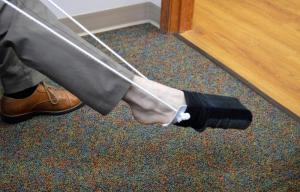A scooter, wheelchair or cane can help you get around if you have trouble on your feet, and a hearing aid can turn up the volume on the world around you. But what about the smaller stuff, like opening a jar, putting on your shoes or reaching across your shoulder to fasten your seatbelt? After all, daily life involves hundreds of little actions that we don’t give a moment’s thought to – until we can’t do them anymore.
As lead occupational therapist at Beebe Healthcare, a big part of my job is helping my patients regain the ability to live independently in the safest way possible. I try my best to help strengthen muscles and fine-tune coordination to help patients perform daily tasks themselves.
Sometimes, though, that’s not an option, whether because of pain or due to a disability. That’s where adaptive equipment comes in.
There is a device to help you perform just about every daily task, and I often work with patients about how to use them to stay independent. Many of my patients avoid tasks or struggle with them for a long time before learning about these options.
For example, there are bendable spoons with reinforced grips for those who have trouble turning their wrist or holding onto a slender handle. Long-handled shoe horns allow people to get their shoes on without bending over. And there is a variety of equipment to open a jar with one hand.
I’d like to describe who might benefit from these devices, suggest a few you may not have heard of, and offer tips on how to find them. Take the opportunity to think about whether you or a loved one could use help performing everyday activities.
Often, the first exposure people have to adaptive equipment is when they are in the hospital. After a hip replacement, for example, patients should not bend forward or cross their legs, which makes it difficult to dress themselves. That’s where reachers or dressing sticks come in, allowing them to compensate for limitations in performing self-care needs without harming the new hip prosthesis.
Your strength, flexibility, mobility or coordination can be limited for a wide variety of reasons. Some of the more common ones include osteoarthritis, stroke, rheumatoid arthritis, generalized weakness, Parkinson’s disease, numbness or tingling in the hands, and recovery after surgery or procedure. This list is not exclusive, and you do not need a diagnosis or specific illness to use these devices. If you or a loved one are having trouble doing any routine task, they’re worth considering.
Essential tasks are the first place to start with adaptive equipment: feeding yourself, dressing yourself and taking care of your other personal needs. Your best bet is to search for these devices on the internet, but here are some examples to get you started:
- Dressing aids can help people put on socks and shoes or fasten a button
- Two-handled mugs, plates with ridges and bowls with suction bottoms can help with eating
- For hygiene assistance, there are shower seats, raised toilet seats and long-handled grooming aids
- Bed rails, seat cushions, walkers and grab bars are available to help with mobility
- Home management can be made easier with pan holders, one-handled kitchen aids and over-the-stove mirrors
- Devices to help with home safety include education timers and locks, no-slip mats and door hinges to widen doorways
- For hobbies, there are long gardening trowels and sewing aids.
Many of these devices are available at department stores. An online search can be more thorough. One website I recommend is www.performancehealth.com. Once you are at the site, click on “Products” in the upper left. Plenty of other online retailers, such as Amazon.com, also sell adaptive equipment.
My fellow occupational therapists and I can also help patients find what they need.
At Beebe, our goal is to help our patients live as independent and satisfying lives as possible while minimizing their pain and risk of injury. Tools such as those to help you cook, brush your teeth and do your laundry can help you stay in your home longer and live the life you want.
Jennifer Guerin, MS, OTR/L, is the lead occupational therapist with Beebe's Occupational Therapy program. She believes in learning about what matters to her patients and helping them meet their goals. Outpatient OT services are provided in the Georgetown, Millville, and Rehoboth Beach locations, as well as inpatient OT care at the hospital in Lewes. For more information about Beebe Physical Rehabilitation Services, call 302-645-3235 or go to www.beebehealthcare.org/beebe-rehab-services.











.jpg)











































